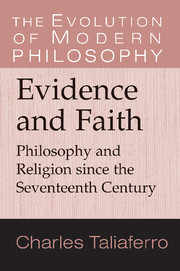Book contents
- Frontmatter
- Contents
- Acknowledgments
- Introduction
- 1 The Sovereignty of the Good in Seventeenth-Century Philosophy of Religion
- 2 Cartesian Philosophy of Religion
- 3 The Ascendancy of Rules of Evidence in Early Modern Philosophy of Religion
- 4 Humean Philosophy of Religion
- 5 Kantian Philosophy of Religion
- 6 Religion and the Philosophical Gods and Giants
- 7 Continental and Feminist Philosophy of Religion
- 8 Five Major Moves
- 9 Religions, Evidence, and Legitimacy
- Appendix A A Guide to Further Study
- Appendix B Select Contemporary Philosophers
- Select Bibliography
- Index
5 - Kantian Philosophy of Religion
Published online by Cambridge University Press: 15 December 2009
- Frontmatter
- Contents
- Acknowledgments
- Introduction
- 1 The Sovereignty of the Good in Seventeenth-Century Philosophy of Religion
- 2 Cartesian Philosophy of Religion
- 3 The Ascendancy of Rules of Evidence in Early Modern Philosophy of Religion
- 4 Humean Philosophy of Religion
- 5 Kantian Philosophy of Religion
- 6 Religion and the Philosophical Gods and Giants
- 7 Continental and Feminist Philosophy of Religion
- 8 Five Major Moves
- 9 Religions, Evidence, and Legitimacy
- Appendix A A Guide to Further Study
- Appendix B Select Contemporary Philosophers
- Select Bibliography
- Index
Summary
Two things fill the mind with ever new and increasing admiration and awe, the more often and steadily we reflect upon them; the starry heavens above me and the moral law within me. I do not seek or conjecture either of them as if they were veiled obscurities or extravagances beyond the horizon of my vision; I see them before me and connect them immediately with the consciousness of my existence. The first starts at the place that I occupy in the external world of the senses, and extends the connection in which I stand into the limitless magnitude of worlds upon worlds, systems upon systems, as well as into the boundless times of their periodic motion, their beginning and continuation. The second begins with my invisible self, my personality, and displays to me a world that has true infinity, but which can only be detected through the understanding, and with which … I know myself to be in not, as in the first case, merely contingent, but universal and necessary connection.
Immanuel KantA Friendship in the Enlightenment
In the late seventeenth and in the eighteenth century in Europe, one may find a movement often referred to as the Enlightenment (in French, Siècle de lumières; in German, Aufklärung). Kant's motto for this period is bold.
- Type
- Chapter
- Information
- Evidence and FaithPhilosophy and Religion since the Seventeenth Century, pp. 215 - 247Publisher: Cambridge University PressPrint publication year: 2005

